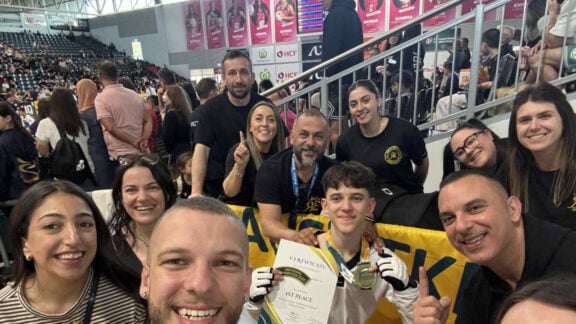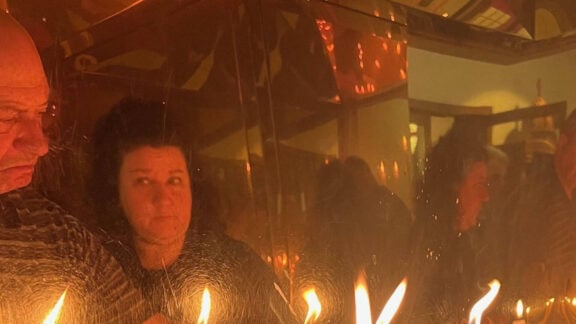The last remaining front of the Schism between secular Greek Australian communities and the Greek Orthodox Archdiocese will continue in South Australia, where it began 64 years ago.
The Greek Orthodox Community of South Australia (GOCSA) held an Extraordinary Special Meeting last Sunday, asking members to vote on three motions to include new articles in the constitution. The second motion, calling on members to vote to leave the Autocephalic church and join the Archdiocese, failed.
Speaking to Neos Kosmos President of GOCSA, Peter Gardiakos, said: “The result of the vote demonstrated that an overwhelming majority supports unity. Unfortunately, the percentage achieved was not sufficient to pass the proposal.”
However, he does not appear willing to abandon the effort.
“In December,” he added, “there will be elections to elect a new board for the Greek Orthodox Community of South Australia. I will run again and pursue the presidency. I will be clear with the members: I will work towards unity because that is what the majority wants.”
On Sunday around midnight, Gardiakos, sent an SMS message to various stakeholders, stating, “We failed to obtain the 75 per cent” (needed to pass the motion), regardless of the majority vote to join, with “61 per cent of people voting to join GOAA, very disappointing result for the majority of members.”
In a Facebook post around 1am (AEST) there was a GOCSA announcement:
“Today was a historic day for the Greek Orthodox Community of South Australia and it was moving to see nearly 500 members come out to decide on an issue that has impacted us all.
After a marathon meeting, the electoral committee have been busy counting the votes. It seems that we did not receive the required percentage of votes to implement any changes at this stage.
– Motion 1: Articles 29 to 33 – Real Estate of the Association
Passed with 63% of members voting to accept the motion (requiring 60% to pass – motion carried and accepted)
– Motion 2: Resignation by GOCSA of its membership of the Autocephalic Church and to enter the proposed Deed with GOAA
Not passed 61% (requiring 75% to pass – not carried)
– Motion 3: Determination as to the interpretation of “Orthodox Faith” and “Greek Orthodox Faith”
Not passed 63% (requiring 75% to pass – not carried)
The Administrative Council will go back to the membership to decide on further steps.”
The only motion of three that passed the 75 per cent threshold guaranteed that GOCSA properties would not go to the Archdiocese.
Over 500 members attended the meeting called for 2 pm Sunday at GOCSA headquarters on Franklin Street. GOCSA General-Secretary Smaro Skordas told Neos Kosmos that the line of members “extended around the corner of Franklin Street.”

The meeting’s chair, Angelo Stathopoulos, a former GOCSA board member, presided over the meeting. Con Costi, GOCSA’s solicitor, spoke on the three motions and the legal framework of the process.
Skordas said that the meeting was run “professionally, efficiently, and was respectful.”
“It was democratic; there was debate and discussion; there were some who opposed it and others who spoke for it,” Skordas told Neos Kosmos.
Skordas said she was “cautiously optimistic” around 11 pm when she spoke to Neos Kosmos and believed that the motions would be carried.
Neos Kosmos understands that two of the most vocal opponents to joining the Archdiocese were John Lesses and Phil Kalogeras, who challenged the motions as “unconstitutional.”
In response, Chief Justice Chris Kourakis and former Director of Public Prosecutions Stephen Pallaras rose and pointed to the advice provided by eminent barristers, KCs, affirming that the motions and process were sound.
While disappointed, the majority—61 per cent of those who attended—voted for the end of the schism, which has buoyed GOCSA administration.
The schism was sparked in 1959 with the arrival of Bishop Ezekiel from Chicago. Ezekiel wanted to assume leadership of all Australian and New Zealand communities and their churches, which included control of community churches, community properties, and clerical influence on boards.
The animus between secular-run communities and the Archdiocese, sparked in Adelaide in 1959, spread like wildfire across Australia wherever there were Greek communities. The impact was also felt on the global Greek Diaspora, and in relations with Greece, the US, and Australia under the shadow of the Cold War.
The traumas of the Greek Civil War, 1945-1949, Greek Junta of 1967-1974, and Turkish invasion of Cyprus 1974, all played out within the Greek Australian diaspora in Australia and found corporeality in the Schism. The fall of the Berlin Wall in 1989 and the Soviet Union’s collapse in 1990, dampened the once sharp demarcations of left and right in Greek post-war communities.

The second, now third, and fourth generations of Greek Australians are so distant from the Schism, its rationale, roots in SA and its meaning as they view heritage, language, community, and church as reciprocal.
Greek communities in Victoria and NSW moved toward reconciliation with the Archdiocese in the late 1980s and 1990s. South Australia though continued to resist. The new Archbishop Makarios in Australia now for five years, and new leadership in GOCSA board, President Peter Gardiakos—seized this chance and sought to end the rift for the sake of Greek unity in SA.
The appetite for reconciliation was also evident from Archbishop Makarios as well as the SA and Commonwealth governments. Premier Peter Malinauskas last Tuesday hoped for unity when launching the Greek Film Festival in Adelaide, earlier this year, Minister Tom Koutsantonis told this masthead that the SA government was happy to legislate for the protection of GOCSA properties against any church encroachment in the future.
Last year, on the invitation of GOCSA, Archbishop Makarios did the unprecedented –last done perhaps in the 1950s – he addressed a large gathering of GOCSA members and assured them that the Church has no interest in GOCSA properties.
In the end, while the outcome of Sunday’s meeting may be disappointing, to many, the process was democratic and respectful. Also, there seems to be clear interest and the will to keep the discussion open and to work to seek another opportunity for unity.
In a letter sent to Neos Kosmos on Monday following the conclusion of the EGM, President Gardiakos stated:
“Thank you to the Electoral Committee for ensuring the voting process ran smoothly, to our wonderful staff who went above and beyond, and to the Administrative Council who have dedicated time and effort and have shown willingness to embark on this challenging journey to put more than six decades of division behind them and grant future generations the opportunity to move forward as one Greek community.
My thanks are due to the nearly 500 members of the Greek Orthodox Community of South Australia who came out last night to decide on an issue that has impacted us all.
We did the best we could thus far to put the decision-making process in members’ hands. I am most grateful to all of you who expressed your opinions and reached out with words of support. I know how hard it was for some of you to come out yesterday, and I only wish I could thank you individually.”









